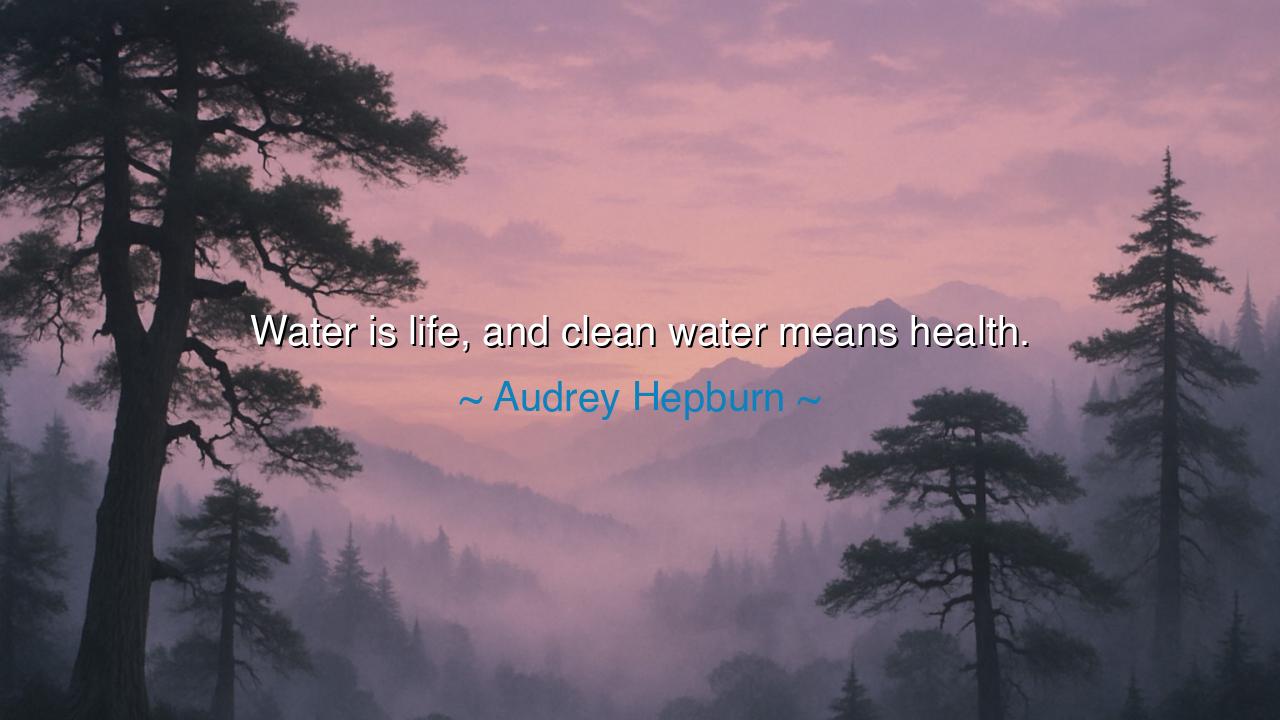
Water is life, and clean water means health.






In the gentle yet powerful words of Audrey Hepburn, a woman whose grace was matched only by her compassion, there flows a truth as ancient as creation itself: “Water is life, and clean water means health.” Though she spoke these words in her later years as a humanitarian, they carry the echo of the ages — the wisdom of the rivers, the rain, and the seas. Water, the first gift of the earth, is not merely a resource; it is the breath of existence, the mother of all living things. Without it, there is no birth, no growth, no song of nature, no pulse of humanity.
To say that water is life is to speak a universal truth known since the dawn of time. The ancients understood this deeply: the Egyptians built their civilization along the Nile, whose floods brought both fertility and salvation. The Greeks worshipped Poseidon, knowing that his temper governed both harvest and ruin. Even in the sacred texts of old, water is the symbol of purity, renewal, and divine grace. It baptizes the spirit as it nourishes the flesh. And yet, though it flows freely through the world, humanity has often forgotten its sacredness. Clean water, Hepburn reminds us, is not a luxury — it is the foundation of health, of dignity, of life itself.
Hepburn spoke these words not as an actress, but as a servant of humanity. After years of fame, she devoted herself to UNICEF, traveling through lands parched by drought and poverty. She saw with her own eyes the suffering of children in places where water — something many take for granted — was a daily struggle. In the villages of Africa, mothers walked miles for a single bucket. Streams ran muddy with disease. And yet, when the wells were dug and the pumps installed, she saw miracles: sickness faded, children smiled, and life returned. To Hepburn, clean water was not simply a necessity — it was hope made visible.
History, too, bears witness to her truth. In ancient Rome, the aqueducts stood as monuments to the genius and compassion of a people who understood that public health begins with pure water. The waters of the Tiber, when tainted, brought plague; when purified, brought prosperity. Centuries later, in the crowded cities of industrial Europe, it was the same — until engineers learned to channel clean water and cleanse the waste, entire populations fell to cholera and fever. Thus, the story of civilization itself is the story of our relationship with water — when we honor it, we flourish; when we pollute or neglect it, we perish.
To say that clean water means health is not mere poetry — it is the very law of nature. Every cell of the body, every spark of life, depends on it. It carries nourishment, cools the fevered brow, and washes away both dirt and despair. Without it, no medicine can heal, no crop can grow, no society can endure. The wise see that to protect water is to protect life itself. It is the healer that asks for nothing but respect, and in return, sustains the world.
And yet, even now, there are millions who thirst. The rivers that once ran pure are clouded with human carelessness, the wells of the poor poisoned by neglect. Hepburn’s words, though spoken decades ago, ring with greater urgency today. For in this age of abundance, the true test of our civilization is not how much we build, but how well we preserve the sacred things — the air we breathe, the soil we sow, and above all, the water we drink. To waste or pollute it is to betray the generations yet to come.
The lesson, then, is both simple and profound: reverence. Treat water not as commodity but as companion. Use it wisely, guard it fiercely, and give it freely where it is needed most. Teach your children to see it not as something that flows from a faucet, but as something that flows from the heart of the earth. Let every drop remind you of your connection to all living things — the trees, the animals, the people who share this fragile world.
So remember, as Audrey Hepburn taught through both her words and her deeds: “Water is life, and clean water means health.” It is not just a call to gratitude, but to action — to cherish, to protect, and to share. For as long as water flows, life shall endure; and as long as humanity safeguards it with care and compassion, there shall be health, harmony, and hope upon the earth.






AAdministratorAdministrator
Welcome, honored guests. Please leave a comment, we will respond soon